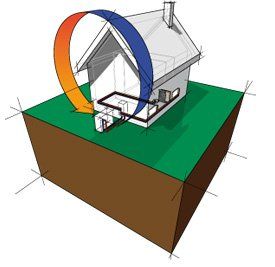
Homeco Energy Air Source Heat Pump
| Energy Source | Tariff |
|---|---|
| Ground Source Heat Pump | 20.89p/kWh |
| Air Source Heat Pump | 10.71p/kWh |
| Solar Thermal | 21.09p/kWh |
Energy-efficient heat pumps
- lower fuel bills, especially if you are replacing conventional electric heating
- could provide you with an income through the government´s Renewable Heat Incentive (RHI)
- lower your home´s carbon emissions, depending on which fuel you are replacing
- don't need fuel deliveries
- will heat your home and provide and hot water
- need little maintenance - they're called ‘fit and forget´ technology
- in many cases can be easier to install than a ground source heat pumps
Air source heat pump savings
| Existing system | Air source heat pump performing at 220% | Air source heat pump performing at 300% | |
|---|---|---|---|
| Gas | £/year | -£100 | £130 |
| Carbon dioxide/year | -30kg | 800kg | |
| Gas | £/year | £380 | £610 |
| Carbon dioxide/year | 4,440kg | 5,270kg | |
| Oil | £/year | £80 | £310 |
| Carbon dioxide/year | 810kg | 1,640kg | |
| Solid | £/year | £100 | £330 |
| Carbon dioxide/year | 4,580kg | 5,410kg |
FAQ
- How do air source heat pumps work?
Heat from the air is absorbed at low temperature into a fluid. This fluid then passes through a compressor where its temperature is increased, and transfers its higher temperature heat to the heating and hot water circuits of the house. There are two main types of air source heat pump system:
- An air-to-water system distributes heat via your wet central heating system. Heat pumps work much more efficiently at a lower temperature than a standard boiler system would. So they are more suitable for underfloor heating systems or larger radiators, which give out heat at lower temperatures over longer periods of time.
- An air-to-air system produces warm air which is circulated by fans to heat your home. They are unlikely to provide you with hot water as well.
- Costs, savings and earnings
Costs
Installing a typical system costs around £6,000 to £15,000. Running costs will vary depending on a number of factors - including the size of your home, and how well insulated it is, and what room temperatures you are aiming to achieve.
Savings
How much you can save will depend on what system you use now, as well as what you are replacing it with. Your savings will be affected by:
- Your heat distribution system - If you have the opportunity, underfloor heating can be more efficient than radiators because the water doesn't need to be so hot. If underfloor heating isn't possible, use the largest radiators you can. We will advise you of the best and most realistic installation method for your property.
- Your fuel costs - You will still have to pay fuel bills with a heat pump because it is powered by electricity, but you will save on the fuel you are replacing, as a result Heat pumps work very well alongside Solar PV systems
- Your old heating system - If your old heating system was inefficient, you are more likely to see lower running costs with a new heat pump.
- Using the controls - We can ensure that each area of your property is ‘zoned' and therefore can be controlled via individual room thermostats. This will ensure the maximum efficiency of your heat pump system is gained.
These are the savings taken from the Energy Saving Trust website that you might make every year when replacing an existing heating system in an average three-bedroom semi-detached home with a typical ASHP installation and a good installation
- Planning permission
Air source heat pump installations In Wales and Northern Ireland require planning permission. In England and Scotland they may be considered Permitted Development, in which case you will not need planning permission. The criteria for air source heat pump planning can vary from site to site, so Homeco Energy will be on hand to help, advise and liaise with any local planning authorities where necessary.
England
From 1st December 2011, domestic air source heat pump systems will be classed as Permitted Development provided that they comply with certain criteria, including:
- There is no wind turbine at the property
- The external unit is less than 0.6 m3 in size
- The unit is more than one metre from the edge of the householder's property
- It is not on a pitched roof, or near the edge of a flat roof
- It meets additional criteria if in a conservation area, World Heritage Site etc.






